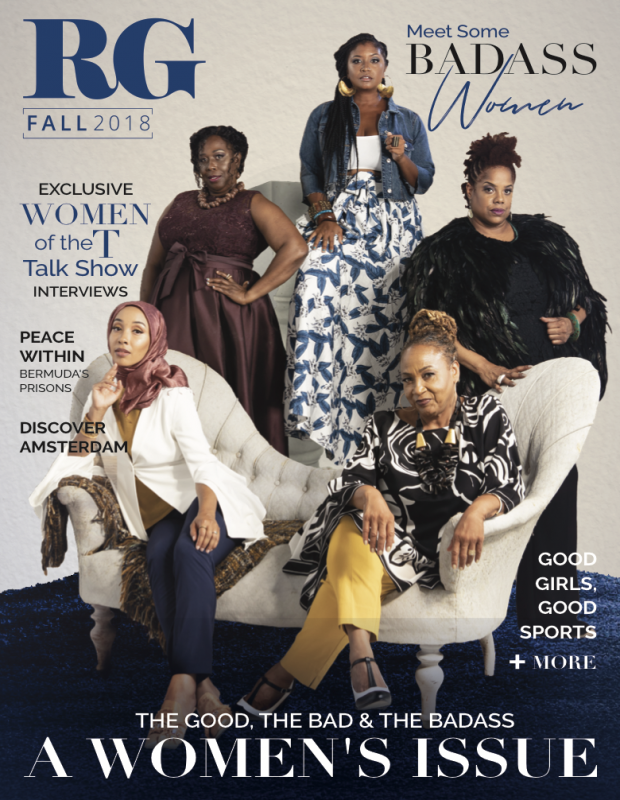There is a new talk show called ‘The T’ in Bermuda and the Caribbean, and the ladies of ‘The T’ are expected to govern your dinner conversation for the next little while. Do you know who they are? We had the opportunity to sit down with each of them and talk first hand about their journeys that brought them to this point, and what exactly they’ll be bringing to the table. They came strong with their ideas on entrepreneurship, marriage, education and bringing the community forward, and we feel confident that they’ll do just that.
Couch: Orange Bay Company
Aziza Furbert
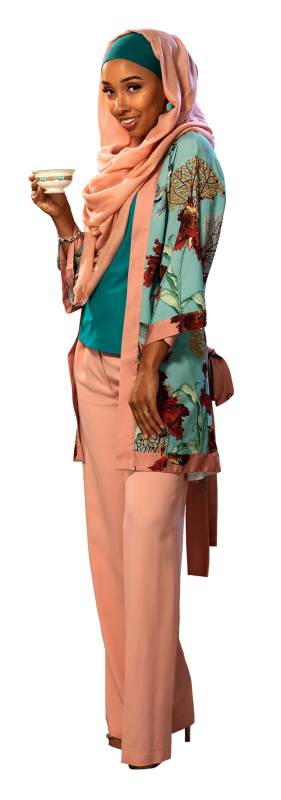
At 33, Aziza is purposefully reserved, poised and insightful. She is a new-ish mother of two who made the difficult decision to leave the corporate world to take on the task of a stay-at-home mom. “It wasn’t something that I wanted to do, but the baby was so tiny, I just didn’t feel comfortable leaving him just yet.” She admits, “The short maternity leave in Bermuda helped move that decision along, three-months (two months of those are paid) wasn’t enough”.
After having experienced new motherhood on the island, Aziza has plenty to add to the conversations of pre- and postnatal healthcare, maternity leave, breastfeeding and the idea that fathers are taking on more domestic roles in the household. “I love the idea of the traditional nuclear family, but my husband is great with the kids, and a great cook –– I don’t cook. Leaving all the care to the mum, can lead to burnout.” She stresses that “as women are stepping up in their careers, it has to be more of a team effort”.
Aziza is working on crushing the stigma towards stay-at-home moms, something she calls “mindful stay-at-home”. “It really depends on what you are telling your kids about why you are home.” She explains, “You have to be sure that you’re not falling into the stereotype. Make sure that they still see hard work, still see the husband working in the house, and the mum doing non-domestic work, even if it’s not at the traditional hours”.
While both she and her husband went to private schools, they’ve decided to put their children in the public system. “There is a stigma that drug dealers live in the public system, but”, she implores, “there are still major social issues in the private system that are not usually highlighted and need to be dealt with, like eating disorders, bullying, suicide attempts, teen pregnancies”.
Aziza believes that her edge among the ladies is in her religion. She can lovingly speak to interfaith relationships, as a Muslim married to a non-Muslim, and educate her viewers on her values, as an individual. “Most people expect that as a Muslim, I would be against same-sex marriage; I don’t believe in shoving religion down people’s throats. Between the conservatives and people who are more moved by social justice, I’m just an ordinary person who’s on the side of the minority voice.” She’s excited to have engaging conversation with interesting women on topics that matter to, not just Bermuda, but the wider world.
Kristin White

At 37, Kristin White is a mother of one, a leader, a social entrepreneur and an advocate for humans in general. Her extensive work in community and youth development gives her an edge and she’s looking forward to bringing that to the conversation. She has been the Marketing Manager for the Centre on Philanthropy, the Development Director for St. George’s Foundation, and the Executive Director for Raleigh Bermuda. She is a bookshop owner, a hoola-hoop maker, and is building up a tourism business that gives tours and re-enactments throughout the East end — by bike.
Her award-winning set of vintage wheels is her most prized possession. “Bicycles have just become a part of my brand.” She says, “It’s the best form of transportation –– it’s sustainable, environmental, and good for your health.” Kristin has already started the conversation on many of the topics that are planned for the show. She leaves an extension of her thoughts on her blog, Kristin dot com,where she writes about “social justice, job creation, climate change, conscription, politics and Top Chef”. If there’s one thing that she’s learned in business and working with youth, it’s that “people don’t care what you know, until they know that you care.” She’s learned to first tell her personal story in order to gain trust.
When she thinks about education, Kristin holds the stance of “inclusivity for all types of learners. We have to find out how people can connect with education in a way that resonates with them.” Not everyone learns the same, and she is passionate about building alternative opportunities to not only learn, but be fulfilled in a job. “I’m happy that my business can present opportunities for actors to work and eventually I’d like to create some sort of framework legislation that creates more jobs, in more areas.”
When she reflects on her life’s mantras, she says, “I’ve been poor, and so I know that I can be [comfortable and] poor. What’s important is to be happy. Be happy, be kind to the planet, and don’t chase money. ’The T’ is a microcosm of the dope-ness of women, I’m ready to make them proud, but also to be a voice for the Caribbean.” Kristin is most excited to talk about culture and race on the show. “I want to bring the conversations that we have privately, to the public and show that black women are engaged. We’ve been killing it all this time; this is just another platform for us to use.”
Marlene Juliette-Flynn
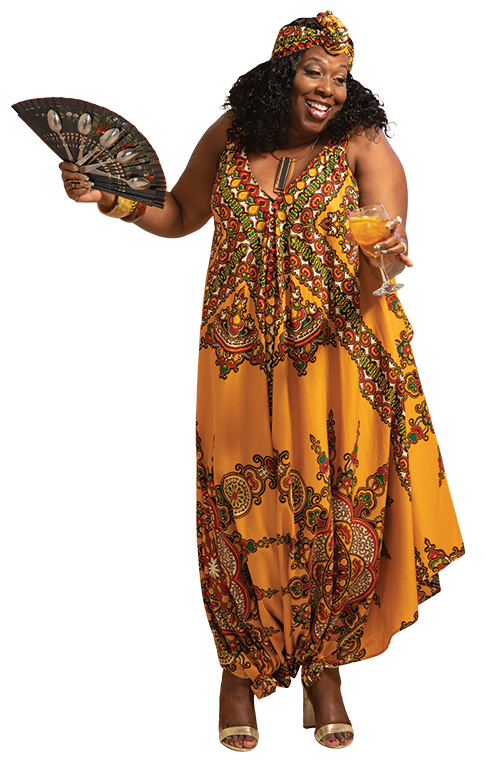
Originally from Jamaica, Marlene is 57 years old, the ex-wife of a prominent martial artist, consequently, a world traveler, and one of Bob Marley’s close cousins. Marlene came to the island with her mothers and sisters to find a better life three decades ago and so, has seen the evolution of the Bermuda immigration system over the years.
“I love people, they are my interest.” She is heavily involved with the Jamaican Association (Bermuda Chapter), the West Indian and Bajan Associations, and worked with the government to build “To Haiti, With Love,” a fundraiser that helped with the damages caused by the slew of hurricanes in 2008. Indeed, her interest is “people” and in particular, a very special interest in the elderly; she wants to make the world a better place to grow old.
Marlene, who fought for the implementation of the original Seniors’ Line at the Bank of Bermuda (now HSBC) in the late 80s, is appalled at the cost of healthcare in general, but more specifically, the cost to take care of our Seniors. This is the conversation that she wants to bring to the table.
“If you haven’t been able to save up loads of money in your lifetime then your children, if you have them, are faced with a very difficult decision,” she states. “Does someone quit work to stay home and take care of their parents or do they put them in a home? All of this to consider, while having to take care of their own children.”
“This talk show is a very powerful platform to both express and influence, not only each other, but the viewers into another way of thinking, another way of looking at the world.” Marlene is excited that the producers saw this power in her at auditions, and takes her new position seriously. She is looking forward to being a channel through which people can relate theirownopinions. “I’m also here to voice the concerns of people that might think like me, but may not have a way to express their thoughts.”
In light of paving the way for new conversation, and making a difference, Marlene is tempted to quote a popular Bob Marley song. Instead she reminds us that “we don’t have to repeat Bob Marley’s songs to find our way; we can create our own redemption song, look at ourselves in the mirror and find our own way forward as a community.”
Teneika Eve
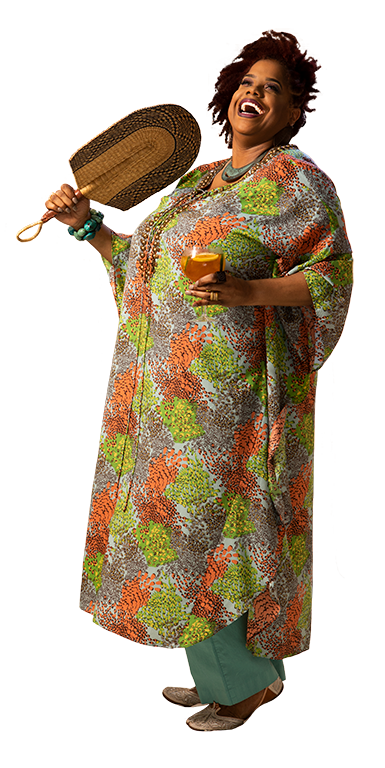
The Bermuda College senior lecturer introduces herself as a 43-year-old, single Christian woman, a Berkeley graduate, and a college dropout. “When I told my parents that I wanted to cook, they put pressure on me to do something ‘better’ with my life. I had to save up enough money to send myself to a culinary arts programme”. From that experience, she implores that parents allow their children to follow their passions –– whatever those might be.
Teneika wants to use the show as a platform to talk about the younger generation from the perspective of what adults need to do, as the village raising them. “Today’s youth are wonderful, but they need more parental guidance. We need to be more uplifting than critical.” She adds, “You catch more flies with honey than vinegar.” She winks.
Teneika, herself, comes from a big family; she is one of six children. “The perspective that I had of my parents was salient in all of my life’s choices.” Her parents had her packing groceries at the age of 12. “In Bermuda, we are culturally-driven to pack groceries. But the job cultivated my work ethic at an early age. It showed me the value in work and saving money.”
Watching her parents celebrate 58 years of marriage has made a huge impression on her. “I feel that there is light and joy in everything and everyone, but I walk in faith and have a biblical world view. I believe that the ideal image [of a relationship] should be between a man and a woman.” Along with same-sex marriage, she also comments on single motherhood. “I applaud single mothers; they are doing a good job, but I believe that any situation that is outside of [the ideal image] is not a part of the original plan, and they are simply doing the best that they can with what they have.”
This world view has kept her from having children. “I only ever envisioned myself as a married woman with kids and I never married.” Despite this, she strongly believes that there are no limits to who you can be, and she is excited to move forward on the show –– and the second half of her life –– as a “renaissance woman” –– the teacher, the researcher, the chef –– and wants to tell viewers, “Don’t put yourself in a box. You can do whatever you put your mind to, and it’s never too late to educate, or be educated!”
Patricia Pugson-Nesbitt
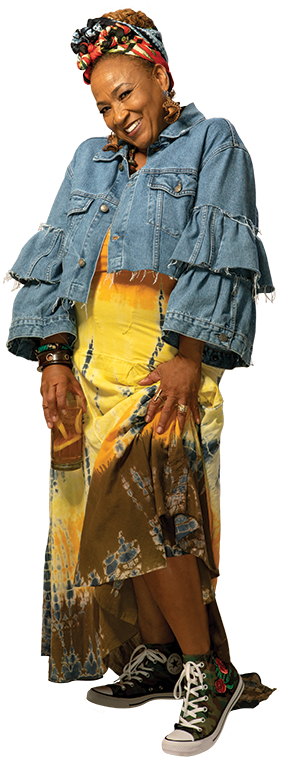
At 59 years old, Patricia, who is pushing for an early retirement at 60, remembers her first typewriter, Sunday school plays, and being pressured to audition for her first Bermuda show. “After getting the lead role, I decided that I wanted to be an actress.” She explains, “At the time, women took on jobs as secretaries, waitresses and hostesses. My mother put pressure on me to have an employable job.” Despite this, she went on to study Theatre, Education and Communicationsat Howard University.
Patricia has worked on meaningful projects that have touched on themes of racism and homosexuality, and has done work with Pride Bermuda (Parents Resource Institute for Drug Education). She started at CedarBridge Academy in 2007.“The plan was to only stay for three years.” Now that she has built up the Drama department, she wants to take her advocacy for professionalism in the Arts one step further, “I want to create a real performing arts centre in Bermuda, and increase the intellectual property on the island”.
She expects this project to change the poor perception of worth. “It’s an expectation that actors will work without pay, but through ‘The T’, I want to prove that actors are intelligent people, and can have intelligent conversations. When you patronise something like this, you are growing a performing arts community in Bermuda.”
“I want to talk about how the Arts are something that can help a person grow as a professional. It teaches etiquette, punctuality, business communication, integrity in work, and that it’s not all about you, it’s about your audience.” Most importantly, she stresses that in order to put on a good show, you have to find your true self.
These are traits that she feels young people can use in today’s social media age. “Kids have to learn self-awareness, they have to learn to be humble. Social media is necessary today, but it’s a set up. These kids are overnight-celebrities without the need for hard work.” She says, “Young people are looking for immediate success and money”.
In her classes, she teaches about network (off the internet) and the value of life skills. “There is inherent goodness in people that live on this Earth. You have to be vulnerable to win; through drama we deal with that. The money and success will come.”
This article was originally published in the Fall 2018 edition of RG Magazine.

